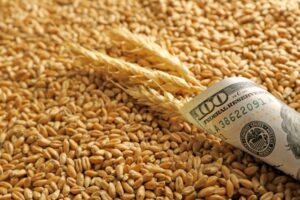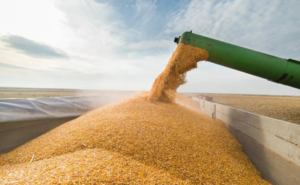
Ukraine exported 3.2 million tons of grains and oilseeds in the first four months of the 2025-2026 marketing year (MY, July-June), according to the Ukrainian Grain Association on Facebook.
According to the infographic, exports were most active in August (3.3 million tons) and October (3.21 million tons). At the same time, exports in October exceeded September figures (2.4 million tons) by 32%.
Wheat sales peaked in August at 2.048 million tons, which is 36.5% more than in October (1.5 million tons). Barley exports were also most active in August (324,000 tons), which is 36.1% more than in September (238,000 tons) and 62% more than in October (200,000 tons).
Corn exports, on the other hand, picked up in October and reached 1.094 million tons, significantly more than the September figure of 61 thousand tons and the August figure of 230 thousand tons.
Foreign trade in soybeans also picked up in October – 230 thousand tons, compared to 78 thousand tons in September and 208 thousand tons in August this year.
Rapeseed exports were most active in August – 519 thousand tons, while in September and October, 220 thousand tons and 177 thousand tons were delivered to foreign markets, respectively.

Rapeseed exports from Ukraine in October will not exceed 135-140 thousand tons, compared to 535 thousand tons last year (-73.8%). As of October 28, 125 thousand tons have already been exported, according to the analytical cooperative “Pusk,” created within the framework of the All-Ukrainian Agrarian Council (VAR).
“Exports are moving very slowly—everything is hampered by duties. It is they that have effectively stopped the normal work of exporters,” analysts noted.
At the same time, they noted that domestic processing volumes are growing.
“In September, we processed more than 100,000 tons of rapeseed, and in October, the figure will be no less. Against the backdrop of problems with sunflower, rapeseed is currently supporting the sector. Rapeseed prices in ports are quoted in the range of EUR 540-545/ton. At the same time, processors offer from UAH 25,000/ton and above,” analysts noted.
The European market is showing positive price dynamics.
“Over the past week, rapeseed exchange quotations have risen by EUR 10. January-February is traditionally expected to be the period of highest prices for this oilseed crop,” added Pusk.

In January-September 2025, Ukrainian enterprises increased exports of ferrous metal scrap by 54.1% compared to the same period last year, from 202,421 thousand tons to 311,840 thousand tons.
According to statistics released by the State Customs Service (SCS), 28,785 thousand tons were exported in September, 34,713 thousand tons in August, 44,842 thousand tons in July, and a record 47, 691 thousand tons, in May – 28.6 thousand tons, in April – 46.321 thousand tons, in March – 39.908 thousand tons, in February – 25.284 thousand tons, and in January – 15.696 thousand tons of scrap metal.
In monetary terms, scrap exports in January-September increased by 44.6% to $93.571 million from $64.703 million.
During this period, scrap exports were formally carried out mainly to Poland (81.95% of shipments in monetary terms), Greece (5.92%), and Italy (4.50%).
In the first nine months of this year, Ukraine imported 34 tons of scrap worth $13,000 from Poland (53.85%), the Seychelles (30.77%), and the British Virgin Islands (7.69%).
As reported, due to the sharp increase in exports of strategic raw materials from Ukraine, the Ministry of Economy, Environment and Agriculture initiated the introduction of a licensing and quota regime for scrap exports with a zero quota. A public discussion of the draft resolution is currently underway. Its implementation is expected to contribute to the smooth operation of Ukraine’s metallurgical and foundry industries, as well as to stabilize the situation with regard to meeting the demand for scrap on the domestic market of Ukraine.
In 2024, Ukraine’s scrap collection companies increased their exports of ferrous metal scrap by 60.7% compared to 2023, from 182,465 thousand tons to 293,190 thousand tons. In monetary terms, scrap exports for the year increased by 73.2% to $91.311 million from $52.723 million.

In January-September of this year, Ukraine reduced exports of semi-finished carbon steel products in physical terms by 38.5% compared to the same period last year, to 941,511 thousand tons.
According to statistics released by the State Customs Service (SCS), in monetary terms, exports of carbon steel semi-finished products fell by 40.7% to $450.242 million.
The main exports were mainly to Bulgaria (36.68% of supplies in monetary terms), Turkey (16.78%), and Poland (13.70%).
During the period in question, Ukraine imported 80,635 thousand tons of semi-finished products worth $59.445 million, mainly from Oman (37.26%), Germany (22.19%), and India (16.31%), while in the first nine months of 2024, it imported 5 tons of semi-finished products worth $5 thousand.
As reported, in 2024, Ukraine increased its exports of semi-finished carbon steel products in physical terms by 56.7% compared to 2023, to 1 million 886,090 tons, while revenue in monetary terms increased by 52.4% to $927.554 million. The main exports were to Bulgaria (32.06% of supplies in monetary terms), Egypt (18.50%), and Turkey (11.14%).
In 2024, Ukraine imported 306 tons of semi-finished products worth $278 thousand from the Czech Republic (88.13%), Romania (7.19%), and Poland (2.88%), while in 2023, it imported 96 tons worth $172 thousand.

In September 2025, Ukraine exported 2.84 million tons of agricultural products, which is 38% less than in the same month last year (4.6 million tons), according to the Ukrainian Grain Association (UGA) on Facebook.
The industry association noted that wheat exports fell by 21% to 1.83 million tons, corn exports fell 8.6 times to 61,000 tons, rapeseed exports fell 3.2 times to 238,000 tons, and soybean exports fell three times to 78,000 tons. Sunflower oil exports fell by 42% to 203,000 tons, and legume exports fell by 24% to 177,000 tons.
The only export growth in September was for barley, which rose by 4% to 238,000 tons.
At the same time, 90% of agricultural products were exported through the ports of Odessa, and 2% through the ports of the Danube. The rest of the agricultural products were transported across the western borders by rail (6%) and trucks (2%).
At the same time, exports through the ports of Odessa in September 2025 decreased by 29.2% compared to the same period last year and amounted to 2.522 million tons, through the ports of the Danube by 6.4 times to 68 thousand tons, by rail by 2.6 times, to 175 thousand tons, and by truck by 3.2 times, to 55 thousand tons.

In January-September of this year, Ukraine increased its ferroalloy exports by 31% in physical terms compared to the same period last year, to 77,514 thousand tons.
According to statistics released by the State Customs Service (SCS), in monetary terms, ferroalloy exports increased by 22.5% to $86.926 million.
The main exports were to Poland (29.02% of shipments in monetary terms), Algeria (21.98%), and Turkey (20.37%).
In addition, in the first nine months of 2025, Ukraine imported 30,341 thousand tons of this product, a decrease of 57.7% compared to the same period in 2024. In monetary terms, imports fell by 53% to $56.990 million. Imports were mainly from Norway (20.88%), Kazakhstan (15.72%), and France (10.58%).
As reported, the Pokrovsky Mining and Processing Plant (PGZK, formerly Ordzhonikidze Mining and Processing Plant) and the Marganetsky Mining and Processing Plant (MGZK, both in Dnipropetrovsk region), which are part of the Privat Group, stopped mining and processing raw manganese ore in late October-early November 2023, while NZF and ZZF stopped smelting ferroalloys. In the summer of 2024, ferroalloy plants resumed production at a minimum level.
PGZK and MGZK did not produce any products in 2024, while in 2023, PGZK produced 160.31 thousand tons of manganese concentrate, and MGZK was idle.
In 2024, Ukraine reduced its exports of ferroalloys in physical terms by 4.45 times compared to 2023, to 77,316 tons from 344,173 tons. and in monetary terms, it decreased by 3.4 times, to $88.631 million from $297.595 million. At the same time, the main exports were to Poland (27.40% of supplies in monetary terms), Turkey (21.53%), and Italy (19.82%).
In addition, last year Ukraine imported 82,259 thousand tons of this product compared to 14,203 thousand tons in 2023 (a 5.8-fold increase). In monetary terms, imports increased 3.3 times, from $42.927 million to $140.752 million. Imports were mainly from Poland (32.71%), Norway (19.55%), and Kazakhstan (13.9%).
The business of ZZF, NZF, Stakhanov ZF (located at NKT), Pokrovsky and Marganetsky GZK was organized by PrivatBank prior to the nationalization of the financial institution. The Nikopol Ferroalloy Plant is controlled by the EastOne group, created in the fall of 2007 as a result of the restructuring of the Interpipe group, as well as the Privat group.